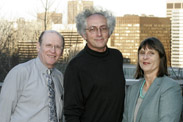McGill's three Killam winners
McGill scholars Luc Devroye, Margaret Lock and Nahum Sonenberg have swept up three of the five Killam Prizes being awarded this year. This marks only the third occasion that one university has bagged three Killam Prizes in the same year.

Killam Award winners Nahum Sonenberg, Luc Devroye and Margaret Lock
Owen Egan
"This is a wonderful and long overdue recognition of three of our most outstanding researchers," says Jacques Hurtubise, acting vice-principal (research). "It's a remarkable testimony to McGill's breadth and strength in research and I am simply ecstatic."
Sonenberg, James McGill Professor in the Department of Biochemistry and the McGill Cancer Centre, says he was happy when he heard he had won the $100,000 prize recognizing him as a leader in his field. "Of course, a true scientist doesn't care what other people think. He only wants to know about the biology and the science," he laughs, "but it is gratifying to know that people appreciate your work."
Sonenberg says the aspect of his work he finds especially rewarding is the link between basic research and human diseases. His lab work focuses on how proteins are created and how the amounts are controlled in the body. "The process we work on has relevance to cancer, obesity and memory." This research has led to a better understanding of types of cancer, and has implications for clinical research into human diseases.
Sonenberg points out that governments and policy-makers often focus on applied research as a way of stimulating the economy and curing human diseases, instead of crucial basic research. "Research such as how the brain works, or how enzymes work, yields a lot of data that is taken up by others and becomes very important for the economy and for health. If drug companies see something that has applications for making drugs they will do it. But today the emphasis is that university professors should also do [applied research], and then you lose sight of curiosity-driven questions."
Margaret Lock, Marjorie Bronfman Professor in Social Studies of Medicine, says she finds her research in medical anthropology gratifying. "I was very surprised and pleased [to hear of the win]," she says.
She has enjoyed the opportunity to live in other parts of the world for her research as she has always had a keen interest in global issues and cultures, "but I also find teaching extremely gratifying. It's something that I believe, in the long run, may produce even more long-term results than research does -- though of course you never have clear evidence of that." She says one of the things she is thinking of doing with part of the prize money is setting up a scholarship.
Lock's work focuses on issues of health and culture, often comparing the views in Japan to those in North America on medical and technological issues such as brain death and organ transplants, as well as cultural approaches to life cycles such as aging. She is currently examining how people and scientists think about genetics and how various groups such as community members, clinicians, researchers and media share knowledge about illnesses like Alzheimer's disease.
Luc Devroye, a professor in the School of Computer Science, says he has no plans to buy a fancy car or swimming pools with his Killam Prize winnings. "My wife runs the finances and does all the planning, and I am very happy with that arrangement."
Devroye has authored six books, and describes his work as being on the crossroads of combinatorial math, probability theory and theoretical computer science. "[My work] has applications in pattern recognition, data structures and algorithms." He has been greatly influenced by the contributions of Russian mathematicians Vapnik and Chervonenkis to the field of statistical learning.
Devroye says he is happy to receive the prize but that mathematicians build on the work of predecessors: "We are where we are because of an army of other people who came before us -- scientists who influenced and taught us, colleagues who helped us and, above all, graduate students who pushed us when the tank was almost dry."
Devroye says the thing he enjoys about his work above all else is what most professors enjoy: "Freedom -- to wake up and decide all by yourself to think about any topic of your choice, research it, take it apart, turn it upside down, understand it, talk about it and then give it a good kick in the right direction."
